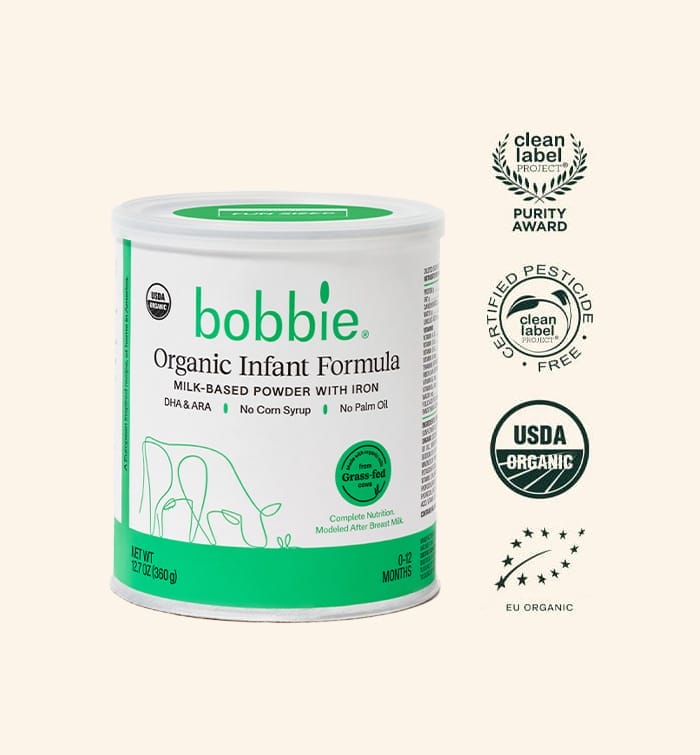We are proud to say that these posts are not sponsored. Our editorial team of Bobbie moms and writers personally select each featured product. If you buy something through our links, we may earn an affiliate commission, at no cost to you.
Parents are presented with an abundance of baby formula options today. The struggle to decipher all the different brands, styles and ingredients is real! Companies don’t make it easy— with their elaborate packaging and hard to read formula labels— when all parents want is to make the best choice for their little ones.
One of the decisions to make is whether you choose an organic baby formula or a non-GMO baby formula— or both! Keep reading to learn about what these terms really mean, their similarities and differences and how to decide which type of baby formula is right for you.
Definitions first: what does it mean to be organic, non-GMO, or regular baby formula
Before we dive into the details of organic vs. non-GMO infant formula vs. regular formula, let’s first get the definitions straight. What do these terms really mean?
What is organic baby formula?
Organic baby formula is made according to the USDA requirements with certified organic ingredients and processing aids. When formulas say “organic” on the ingredients label, 95% or more of the ingredients must be certified organic. This means they do not contain pesticides, certain chemicals, additives, dyes, or GMO ingredients.

Shop Bobbie Organic Infant Formula
Bobbie Organic Infant Formula is a USDA Organic, EU-style infant formula that meets all FDA requirements. It is a complete nutrition milk-based powder modeled after breast milk and is easy on tummies. It is non-GMO and doesn't have corn syrup, palm oil, or maltodextrin. Learn more about Bobbie.
What is non-GMO infant formula?
Non-GMO infant formula is formula made without genetically modified organisms.
Non-GMO standards are not equal to organic standards, so non-GMO formula (or other foods) are not automatically organic.
What is regular baby formula?
Regular baby formula may also be referred to as GMO formula. There are no limitations when it comes to the use of ingredients made with genetically modified organisms for these products. A GMO (a genetically modified organism) is “a plant, animal, microorganism or other organism whose genetic makeup has been modified in a laboratory using genetic engineering or transgenic technology.”1
One concept to keep top of mind:
Organic formulas are always free of GMO ingredients, but non-GMO formulas are not automatically organic. Yes, that’s a bit tricky!
Let’s break it down with the help of Elieke Kearns, PhD, RD and Head of Medical Affairs at Bobbie. She tells us, “Organic refers to the farming practice of how an ingredient is grown and is defined by the USDA. It does not allow for things like synthetic pesticides or genetically modified organisms (aka GMOs). Essentially, all organic ingredients are non-GMO but not all non-GMO ingredients are organic.”
Should parents choose an organic, non-GMO infant formula?
All infant formulas in the US must comply with the Food and Drug Administration’s (FDA) requirements for infant formula.2 These products are carefully regulated to ensure they provide adequate nutrition to support the growth and development of infants who consume them. In other words, the bar is already set quite high for all infant formulas, whether or not they’re organic or non-GMO.
Dr. Kearns agrees, reinforcing that, “Selecting what to eat or drink is a very personal choice, this is also true when choosing between organic vs. conventional. When it comes to this choice, the most important thing to know is that whether you eat food that is organic or contains GMOs, it is safe. This is something that independent scientists, as well as organizations around the world, agree on after analyzing multiple decades worth of data. In the US, we have the comfort of knowing that all foods are regulated for quality and safety by the federal government.”
Along these lines, the FDA requires infant formulas to contain certain amounts of vitamins and minerals known to be critical in supporting early life nutrition, for example, B vitamins, iron, and calcium. These ingredients are only created and available in synthetic form. All infant formulas – even those labeled organic – use these synthetic ingredients. This is one example of the strict regulations set by the FDA to ensure infant formulas provide adequate nutrition to support your quickly-growing baby!
What is GMO in baby formula, anyway?
Formulas that are not GMO can be made with genetically modified ingredients. You might wonder which ingredients are actually GMO? This may include the protein ingredient(s), especially if the formula is cow-milk based. Genetically engineered products are common in animal feed, so the cows that provided the milk that the formula is based on were likely fed genetically modified crops. Hence, that milk protein is a GMO ingredient.
Other genetically modified ingredients may be corn and soy in baby formula. Corn shows up as corn syrup (a carbohydrate source), and soy may be present as soy oil (a fat source). The wide majority of the corn and soy grown in the US is genetically modified.3
GMO vs. non-GMO baby formula
Many parents wonder if they need to choose a non-GMO formula for their baby. After extensive study, the National Academies of Sciences, Engineering, and Medicine have reported on the safety of genetically engineered crops, which should help assure parents that choose regular formulas.
At the same time, nutrition science is always evolving, and there are sure to be more learnings on this topic with time.
For parents trying to make a decision, some aspects to consider are the exposure to chemicals, pesticides, and genetically modified ingredients that your baby may have with a GMO formula. On the other hand, the cost of non-GMO formulas will be a bit higher than regular, GMO-containing formulas. It very much comes down to what’s most important to you as a parent, and there’s no one right answer.
No matter which type of formula you choose to feed your baby, all infant formulas are modeled after breast milk.4 This means there’s one main source of inspiration for the many feeding options available to you. This also means you really can’t go wrong! And remember, your babe is nourished most by your love and affection. So cuddle up and trust that you’ve made the right choice.
Always check a product’s label for the most current nutritional and ingredient information. Ask your pediatrician for any questions/concerns.

Shop Bobbie Organic Infant Formula
Bobbie Organic Infant Formula is a USDA Organic, EU-style infant formula that meets all FDA requirements. It is a complete nutrition milk-based powder modeled after breast milk and is easy on tummies. It is non-GMO and doesn't have corn syrup, palm oil, or maltodextrin. Learn more about Bobbie.
Sources:
- What is a GMO? – The Non-GMO Project
- Infant Formula Registration & Submissions | FDA
- Recent Trends in GE Adoption
- Bioactive Compounds in Infant Formula and Their Effects on Infant Nutrition and Health: A Systematic Literature Review

